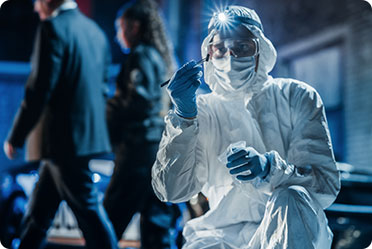
This rule was adopted in 2013 to address the issues raised by the U.S. Supreme Court’s decision in Melendez-Diaz v. Massachusetts, 557 U.S. 305 (2009), that held that the 6th amendment confrontation right precluded presentation of laboratory reports without a live witness testifying in the trial. In Melendez-Diaz, the U.S. Supreme Court noted with approval the use of ”notice and demand” procedures as a means of permitting routine laboratory reports to be admitted without the expense of supporting the admission by live expert testimony while protecting a defendant’s confrontation rights.
This rule provides a ”notice and demand” procedure for Pennsylvania. Under the rule, the attorney for the Commonwealth may seek to admit a forensic laboratory report as evidence without the testimony of the analyst who performed the testing that was the subject of the report if notice requirements are met and no demand for the presence of the analyst is made. If the defendant makes such a demand, the analyst would be required to testify before the report could be admitted into evidence.
Nothing in this rule is intended to preclude a stipulation agreed to by the parties for the admission of the laboratory report without the analyst’s presence.
For cause shown, the judge may extend the time period of filing a demand for live testimony or grant a continuance of the trial.
For purposes of paragraph (D)(2) of this rule, a laboratory is ”accredited” when its management, personnel, quality system, operational and technical procedures, equipment and physical facilities meet standards established by a recognized state, national, or international accrediting organization such as the American Society of Crime Laboratory Directors/Laboratory Accrediting Board (ASCLD/LAB) or Forensic Quality Services—International (FQS-I).
Rule 574. Forensic Laboratory Report; Certification in Lieu of Expert Testimony
- In any trial, the attorney for the Commonwealth may seek to offer into evidence a forensic laboratory report supported by a certification, as provided in paragraph (D), in lieu of testimony by the person who performed the analysis or examination that is the subject of the report.
- Notice
- If the attorney for the Commonwealth intends to offer the report as provided in paragraph (A) as evidence at trial, the attorney for the Commonwealth shall serve upon the defendant’s attorney, or if unrepresented, the defendant a written notice of that fact at the time of the disclosure of the report but no later than 20 days prior to the start of trial.
- A copy of the report shall be provided to the defendant prior to or contemporaneously with the notice.
- Except as provided in paragraph (C), the report and certification are admissible in evidence to the same effect as if the person who performed the analysis or examination had personally testified.
- Demand
- No later than 10 days following receipt of the notice provided in paragraph (B), the defendant’s attorney, or if unrepresented, the defendant may serve upon the attorney of the Commonwealth, a written demand for the person who performed the analysis or examination that is the subject of the report to testify at trial.
- If a written demand is filed, the report and certificate are not admissible under paragraph (B)(3) unless the analyst testifies.
- If no demand for live testimony is made to the use of the laboratory report and certificate within the time allowed by this section, the report and certificate are admissible in evidence.
- Certification
- The analyst who performed the analysis or examination that is the subject of the report shall complete a certificate in which the analyst shall state:
- that he or she is qualified by education, training, and experience to perform the analysis;
- a description of his or her regular duties;
- the name and location of the laboratory where the analysis was performed; and
- that the tests were performed under industry-approved procedures or standards and the report accurately reflects the analyst’s findings and opinions regarding the results of those tests or analysis.
- An analyst employed by a laboratory that is accredited by a state, national, or international accreditation entity may, in lieu of the required certificate under paragraph (D)(1), submit a copy of the laboratory’s accreditation certificate.
- The analyst who performed the analysis or examination that is the subject of the report shall complete a certificate in which the analyst shall state:
Official Note: New Rule 574 adopted 2012, effective 2012.
Leckerman Law focuses on safeguarding the
rights of individuals charged with DUI, DWI, DAI, and
other alcohol-related criminal offenses - Call Us Now For
NJ DWI (856) 429-2323 | For PA DUI (215) 496-9292